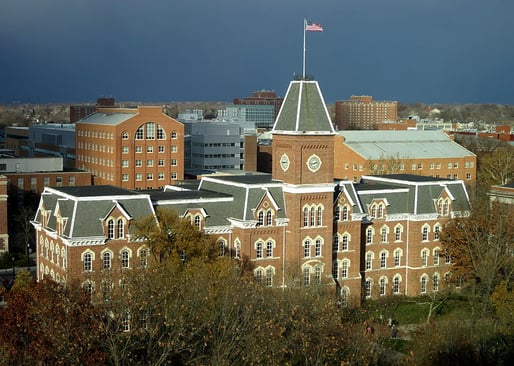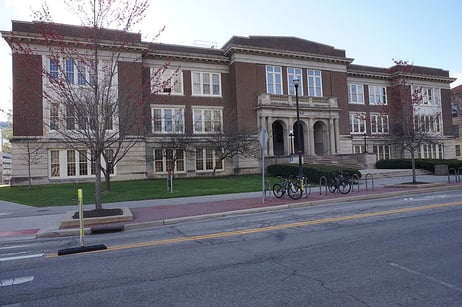Although people expect to go to the hospital to be treated for their illnesses, sometimes patients can acquire fungal infections during treatment that can make them even sicker. The fungus Candida albicans is a common hospital-acquired fungus that can get into the bloodstream and vital organs, leading to a mortality rate of up to 75% of infected patients. Researchers at The Ohio State University in Columbus have found a potential approach to fight these infections.
Read MoreTags: Ohio State University, Columbus, OH, OhStu, 2016, BioResearch Product Faire, Candida albicans

(Image courtesy of Wikimedia Commons)
Dr. Abraham Badu-Tawiah, assistant professor at Ohio State University, is out to revolutionize the world of diagnostic testing. By making paper strips that can detect malaria and well as certain types of cancers, he hopes to make testing more practical and affordable. People would be able to simply apply a drop of blood to the paper test strip at home, much like diabetics do when testing their blood sugar, and then mail it to the laboratory. This new method would make medical diagnostics much more accessible for those who can't easily get to a lab for testing.
Read MoreTags: Midwest, Ohio State University, Ohio, Cancer, malaria, biotech vendor show, Columbus, Dr. Abraham Badu-Tawiah
A pioneering new study at Ohio State University found a link between chronic stress and short-term memory issues. In the study, mice were subjected to repeated visits from an aggressive, larger intruder mouse. Researchers found that the mice repeatedly exposed to the intruder had more difficulty recalling where the escape hole was in a maze they’d mastered prior to the stressful period, compared to mice that had not been stressed.
(Image Courtesty of Wikimedia Commons and Maria Rimmel)
Read More
Tags: Ohio State University, Ohio State, Ohio State University life science research, brain research, Ohio State life science, Ohio State life science research, Biotechnology Vendor Fair, Ohio State University life science, Columbus, OH, OhStu, stress, 2016, Dr. Godbout, memory loss
Developing a novel cancer-busting drug is only useful if it can actually be administered to the affected area. We saw last July how UIUC researchers are sneaking drugs past the immune system so they don’t get destroyed in transit. Taking the next step, researchers at The Ohio State University are developing a “Trojan horse” that allows drugs to successfully invade leukemia cells.
Read MoreTags: Ohio State University, BioResearch Product Faire Event, Columbus, OH, OhStu, 2016
We’ve seen bacteria eat chlorine and even consume toxic byproducts of biodiesel plants, but researchers at The Ohio State University have found a new strain that takes the cake. These extremophiles literally eat biocide designed to kill them.
Read MoreTags: Ohio State University, 2015, BioResearch Product Faire Event, Columbus, OH, OhStu
We often hear about the dangers that human encroachment has on coral reefs, but far less often do we hear of ways the coral can survive. Though global warming continues to threaten the coral reefs of the world, researchers at The Ohio State University have discovered that some species of coral are actually doing a very good job of surviving, and that their rate of survival is directly proportional to their fat content.
Read MoreTags: Ohio State University, 2015, BioResearch Product Faire Event, Columbus, OH, OhStu
We’ve recently seen some compelling results when it comes to destroying brain tumors. A UCLA team blasted tumors with nanoparticles and a Washington University team shut down stem cells in the tumors to prevent them from regenerating. But what if we saw the tumors forming so far in advance that we didn’t need to blast them or worry about their regeneration? A breakthrough from Ohio State University proposes a way to forecast brain tumors long before their onset.
Read MoreTags: Ohio State University, 2015, BioResearch Product Faire Event, Columbus, OH, OhStu
Growing human organs outside of the body is more reality than science fiction these days. We have seen researchers reproduce a human heart from bicep muscle cells at the Mayo Clinic in Rochester and grow stomachs and intestines in the labs of the University of Cincinnati. Now The Ohio State University is taking on the challenge of recreating the human brain.
Tags: Ohio State University, 2015, BioResearch Product Faire Event, Columbus, OH, OhStu
 With the assistance of a recent $10 million contribution to Ohio State University, donors Stan and Joan Ross are helping to establish the Stanley D. and Joan H. Ross Center for Brain Health and Performance. Once open, this center will coincide with the Brain and Spine Hospital currently being constructed at the Ohio State University Wexner Medical Center that is slated to open in 2016. (Image courtesy of Nheyob via Wikimedia Commons).
With the assistance of a recent $10 million contribution to Ohio State University, donors Stan and Joan Ross are helping to establish the Stanley D. and Joan H. Ross Center for Brain Health and Performance. Once open, this center will coincide with the Brain and Spine Hospital currently being constructed at the Ohio State University Wexner Medical Center that is slated to open in 2016. (Image courtesy of Nheyob via Wikimedia Commons).
Tags: Midwest, Ohio State University, 2015, BioResearch Product Faire Event, Columbus, OH, OhStu, New research center, Wexner Medical Center, Brain Health and Performance


